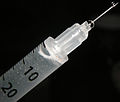| | |
| Authority overview | |
|---|---|
| Formed | 13 March 2006 |
| Dissolved | 30 June 2020 |
| Superseding authority | |
| Jurisdiction | Australia |
| Headquarters | Fyshwick, Australian Capital Territory, Australia |
| Minister responsible | |
| Key document |
|
| Website | www |
| Part of a series on |
| Doping in sport |
|---|
  |
The Australian Sports Anti-Doping Authority (ASADA) was a Federal Government statutory authority tasked to protect Australia's sporting integrity through the elimination of doping. [1] The authority was part of the Department of Health's portfolio and was established on 13 March 2006 under the Australian Sports Anti‑Doping Authority Act 2006. On 1 July 2020, it became part of Sport Integrity Australia. [2]
Contents
The ASADA drug tested Australian athletes who competed at state and national levels. ASADA also tested international athletes if they were competing in events held in Australia. It was also ASADA's role to inform the sporting community of drugs and related safety issues. The ASADA Advisory Group was relied upon by the Chief Executive Officer, David Sharpe, as a consultative forum on matters related to the agency's purpose. [3]